The Venture Bros: “The Terrible Secret of Turtle Bay” part 2
Act II of “The Terrible Secret of Turtle Bay” begins with a continuation of the episode’s “B” story, as Hank and Dean seek adventure while stuck in a hotel room in New York City. Their father, Dr. Venture, has forbidden them to leave. Dr. Venture was a boy adventurer when he was their age (younger even), but the grown Rusty aggressively denies the boys their own adventures. This is his trip, to exorcize his demons, the boys don’t enter into his plans. One guesses he’d rather not have the boys on the trip at all. One guesses, in fact, that he’d rather not have the boys, period.
So the boys play astronaut with a paper cup in the bidet, then, when that gets boring, they move on to playing submarine in the bathtub with the case that Rusty’s invention came in.
Meanwhile, Bad Guy Plot A asserts itself as Senzuri Otaku sneaks into Rusty’s hotel room to a) poison him and b) steal his new invention. He tries to poison Rusty with a trick lifted from You Only Live Twice, the high-water mark of the 1960s James Bond adventures (that’s the one with the volcano lair and the army of ninjas), but is foiled when Hank and Dean, pursuing their B plot, walk in the door. The key to the joke, in a way the key to the joke of the show (if I may be pedantic for a moment), is that Hank and Dean foil an assassin’s plot and save their father’s life inadvertently, and unknowingly. “Assassin Tries to Kill Man, Sons Stop Him” is a plot for a thriller, “Assassin Tries to Kill Man, Sons Unknowingly Prevent Him While Looking for a Box to Use as a Pretend Submarine” is a plot for a farce.
In any case, long story short, Senzuri steals not Rusty’s invention but Hank and Dean. Senzuri might be a terrible ninja, but he has skills enough to dispatch Hank and Dean and leave them in an alley. “You win this round, Dr. Venture!” shouts Senzuri in classic villain mode, shaking his fist at the lightning-laced sky, bringing into play another important aspect of the show, that bad guys need good guys to give their lives purpose. Rusty, of course, hasn’t “won a round,” he doesn’t even know that Senzuri was trying to steal his invention, and, more important, he isn’t even really aware he’s a “good guy” with “bad guys” after him. In at least one way Rusty has succeeded in escaping his past, he no longer sees the world in terms of costumed bad guys scheming to do him in, his demons are internal. His goal is to escape his childhood and the costumed villainy that goes along with it. It’s constantly a surprise to him that another demented freak in a costume shows up to torment him. Rusty left the boy-adventuring game a long time ago, never wanted to be in it in the first place, thinks of it as a scar he must heal, but the world won’t let him forget. He’s trying to grow up but the world keeps insisting he remain a child.
Come morning, Hank and Dean are unconscious in an alley and their wrist communicators have been stolen by a couple of street toughs. Brock alerts Rusty to the situation (waking him from a dream of himself in the womb – speaking of trying to escape childhood) and Rusty orders him to find them – not because he wants them back, but so that they won’t “screw up his gig at the UN.”
Bad-Guy Plot B then asserts itself as The Monarch, having flown to New York after his abortive meteor attack, coincidentally finds Hank and Dean before Brock can. Rusty can’t be bothered to look for his sons, and Brock casually heads off in the wrong direction, but The Monarch has no problem finding them without even trying, and actually without even meaning to. Again, anti-plot emerges, the foiling of expectations. Which brings to mind that the sources The Venture Bros draws from are poor models of plot themselves, starting with Hanna-Barbera cartoons, leading to James Bond and Marvel Comics. Theatrics and spectacle always trump logic and motivation in those tales, and the characters of The Venture Bros are obsessed with them. In a way they are chiefly concerned with “the moment,” the pose, the drama, and will take it any way they can get it. So when The Monarch sees Hank and Dean sitting like a couple of idiots in an alleyway, he doesn’t say “Hey, that’s weird,” rather he says “Hm, Dr. Venture’s precocious progenies. They will be his undoing.” An opportunist seeking a pose (and what man dressed as a butterfly is not seeking to pose?), he “monologues” even though his audience, a cab driver, isn’t paying attention and wouldn’t know what he was talking about if he were.
The Monarch chases Hank and Dean to the subway, where he gets caught in the doors of the A train and dragged off the platform. Meanwhile, over at the UN, Pete White and Billy Quizboy gossip about Dr. Venture, specifically about his relationship to Brock (Pete thinks Rusty is gay). Pete and Billy are, for the moment anyway, representatives of the “real world,” looking at the rules of boy-adventuring from the point of view of free-range adults. Starting with Bruce Wayne’s adoption of Dick Grayson, boy-adventuring is filled with pairings and ad-hoc families that would look, at best, suspect from a contemporary view. And yet, satirists aside, it’s never been seriously questioned by readers why Bruce Wayne has a “ward” who’s a teenage boy or why it’s okay for Dr. Quest to take his preteen son and his preteen son’s preteen friend on dangerous adventures with spies and supervillany; it’s a convention, like so much else in the world of popular culture, accepted without suspicion. Why is it accepted without suspicion? The answer, alas, is economic: Bruce Wayne has Dick Grayson because DC comics found out that kids read Batman and wanted to give them a character they could relate to. Everyone “knows” that the Bruce/Dick dyad makes no logical sense, but everyone knows that it makes economic sense: it sells comic books. We accept Bruce and Dick (certainly the two most unfortunate names for a couple trying to appear not-gay) because we know that their relationship is based not on love but on shifting units. Which brings us back to Rusty, who has discovered that super-science, super as it may be, is only useful, only employable, when underwritten by a huge corporation. If Warner Bros tells us that Bruce and Dick are okay because that’s how we get more Batman stories, we accept it as part of the cultural exchange, we take the capitalist basis of their relationship as understood, as a given. Many of the characters in the Venture world, unfortunately, don’t have a capitalist aspect to their agendas, or rather, they’re not in on the capitalist joke. They toil in their roles as good guys or bad guys, unaware that the reason for their existence is a monetary one. They are garish, lurid expressions of real dramatic characters, given colorful gloss and cardboard motivations in order make serious stories more fun. Captain America made World War II fun, Superman made the Depression fun, James Bond made the Cold War fun, but the Venture characters live in the present, torn from the context of their cultural roots. They wear the clothes and strike the pose but inside they know that it’s all meaningless now, just sound and fury. They’re Joe Kirby characters living in a Christopher Nolan world.
Speaking of Jack Kirby characters, here’s one now, Professor Impossible, a carbon-copy of Mr. Fantastic, presenting his new invention, an electric car that helps repair the ozone layer. Mr. Fantastic is the protoypical New Frontier superhero, the Kennedy-esque foundation of the Marvel Era, his stretchiness a metaphor for the unlimitless possibilities of the US as a technological superpower, and presumably a friend to Rusty’s famous father. And now here he is, at Rusty’s big moment, stealing his thunder. Rusty’s father is dead but his generation continues to assert its greatness, its meaningfulness. (Of course, Professor Impossible is also a total dick, but that’s another story.)
Hank and Dean, meanwhile, stumble into Times Square, which has been “Brisby-fied” (The Disneyification of Times Square was a big story in the early ‘oos). In spite of New York’s corporate makeover (I doubt even the makers of The Venture Bros would have guessed that Disney would one day own both Marvel Comics and Star Wars), there are still hookers around, and Hank and Dean evade the Monarch’s clutches (again, inadvertently) by going off with one.
Brock (who is part of the B story) pursues Hank and Dean but finds only the two street toughs who stole their watches. Again asserting his overqualifications, he destroys their apartment and kills them. So, to recap, Hank and Dean’s plot so far is: looking for a box to use as a pretend submarine, Hank and Dean are inadvertently kidnapped by one villain, dumped in an alley, robbed by a couple of passing toughs, then pursued by a second villain, who has found them, inadvertently, while their bodyguard hunts them down and exacts brutal revenge, not on the villain who kidnapped them or the villain who is pursuing them across New York, but on a couple of teenage goons who stole their watches while they were unconscious.
Finally, the A plot comes to full boil as Rusty presents his invention. His speech is cloaked in the vocabulary of the New Frontier (he’s trying to escape his father’s shadow but can’t even find his own words to do so), but his invention, “The Oo Ray,” is a gun that melts cities. Rusty, in his monomania, hasn’t stopped to consider that what he’s invented is a weapon of mass destruction. The UN Guy (who has Norman Osborn’s hair) admonishes Rusty that this conference is supposed to showcase inventions for the betterment of mankind, but Rusty, being amoral, has no concept of “betterment.” More tellingly, when the UN Guy yells at him Rusty immediately drops the paternal New Frontier tenor and becomes a whining child, complaining “Hey, I worked really hard on this thing.” Again, “betterment” isn’t the goal, self-aggrandizement is. The presentation is a disaster, leaving the Oo Ray open to the predations of Senzuri.
Meanwhile, across town, Hank and Dean, observed by The Monarch, spend some time with their sleazy hooker. The boys aren’t just innocents abroad, they’re fictional characters brought into a non-fictional world. The capitalist agendas of the real world (Brisby taking over Times Square, their father’s cosmetics contract, street toughs taking their wallets, a woman who charges for “adventure”) keep surprising Hank and Dean, who have sprung from a fictional construct (in more ways than they could ever understand). They flee the hooker in terror. Across the street, The Monarch barely has a chance to spit out his coffee before Brock comes along to torture him. Again, Brock’s assignment is “to get they boys,” but in spite of them being across the street, Brock prefers to stay and torture the costumed villain who happened to be standing outside the building at the time.
The boys run to the UN, again inadvertently, and decide to “go surprise” Rusty. Rusty, who’s wallowing in his post-defeat bitterness, is flatly disgusted that the boys have shown up at all; he’d rather they were still missing. Nevertheless, he wants to exit this debacle as quickly as possible and goes to pack up the Oo Ray, only to find Senzuri masturbating on it. That, it turns out, is the terrible secret of Turtle Bay: Senzuri is not an evil scientist or even an evil ninja, or even an adequate ninja, he is merely a pervert, and an easily-caught one at that. He’s taken away by the authorities and Rusty, in one way, finds a happy ending in his plot: the Army will buy a hundred of his city-melting gun. Again, capitalism wins and personal motivation fails. Senzuri may be a sexual freak but his motive is pure; torn from his cultural context and set adrift in a concrete world, he seeks no profit from his perversion but is trumped by an army with limitless funds.
The A story and B story meet up, but remain unrelated, because Hank and Dean refuse to leave their narrative construct while Rusty, in his craven, amoral way, at least partially succeeds in escaping his. Meanwhile Brock has no problem traversing both worlds; we find him, after torturing The Monarch, in bed with the sleazy hooker and having totally forgotten about his mission. The Monarch, meanwhile, finds his plot once again short-circuited; we find him in the hospital, bloodied and bandaged, his butterfly wings removed from his stomach. Turtle Bay is full of dead-ends and lost souls. Some know they’re lost, others can’t see it, or refuse to.
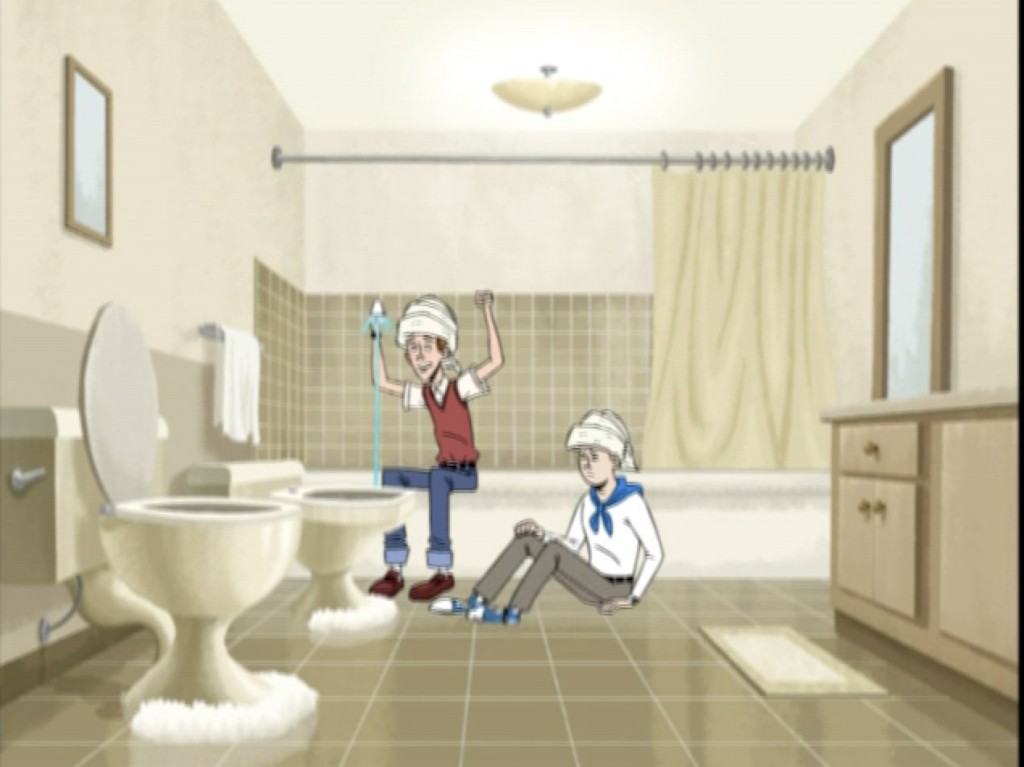
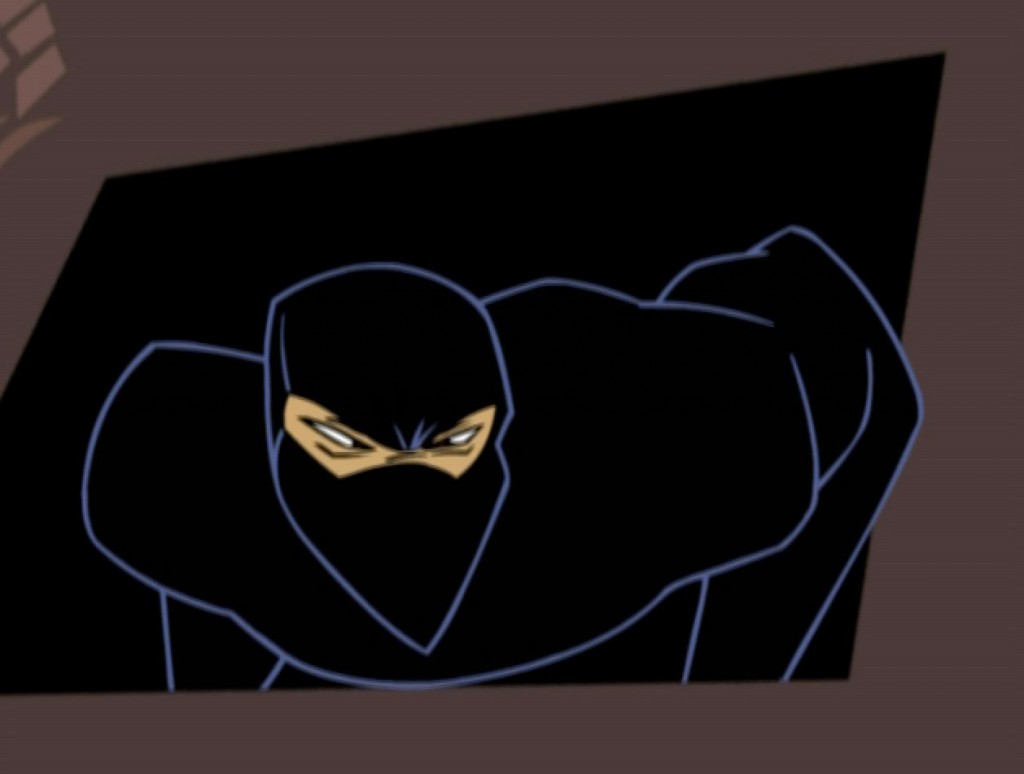
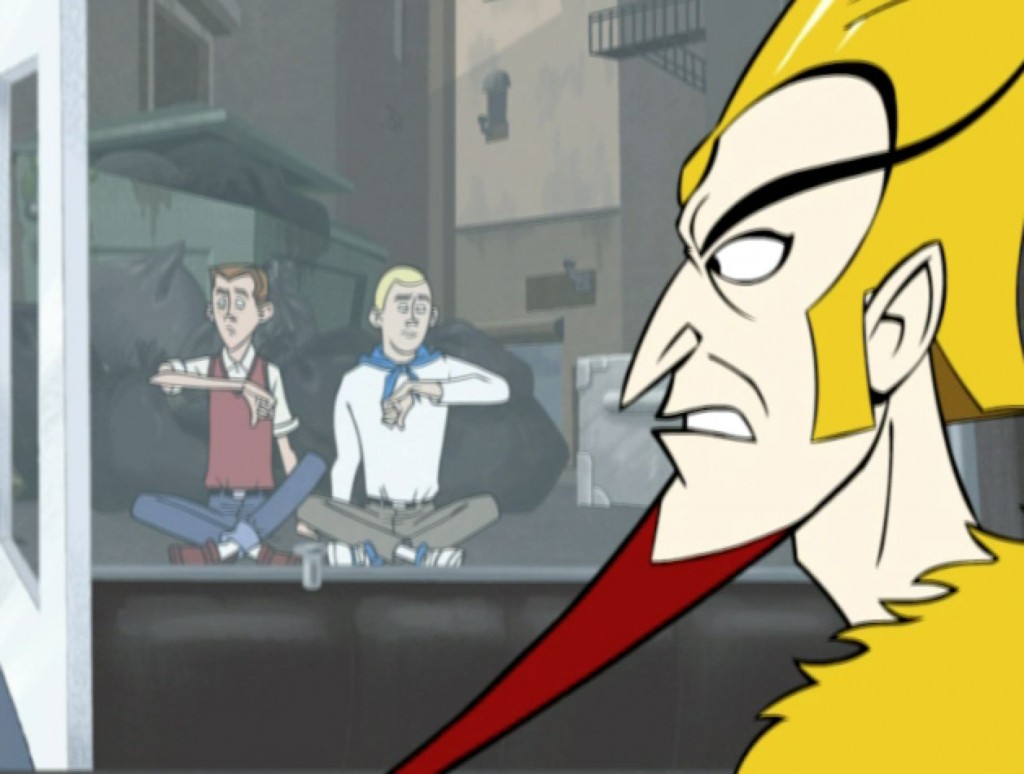
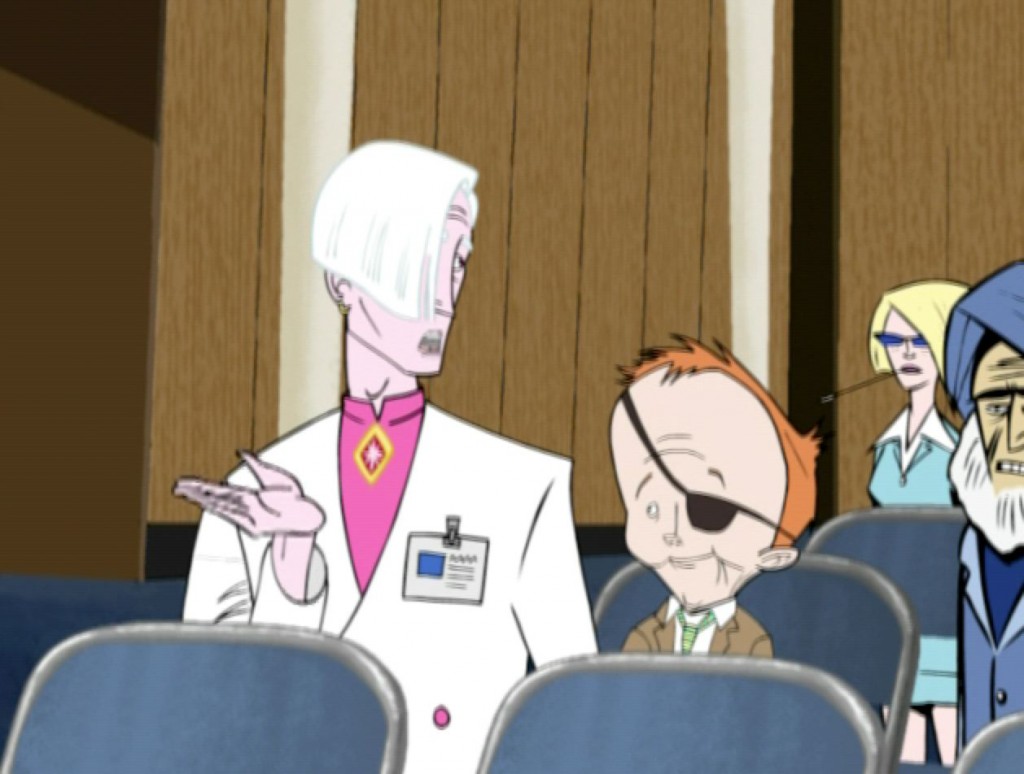
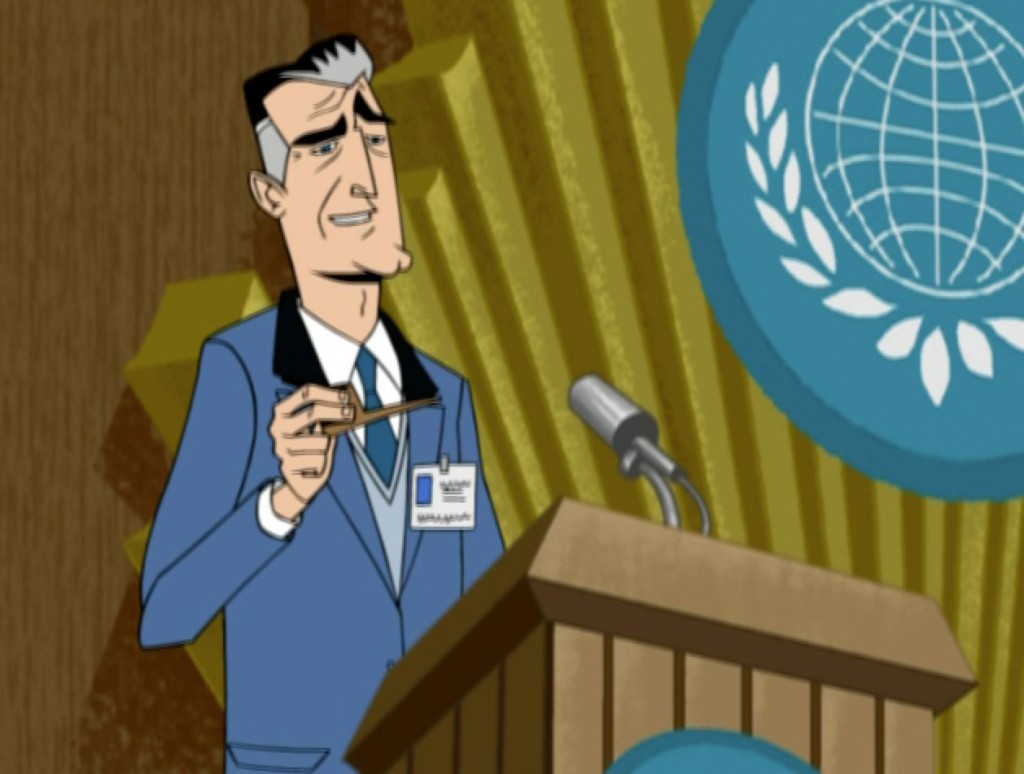
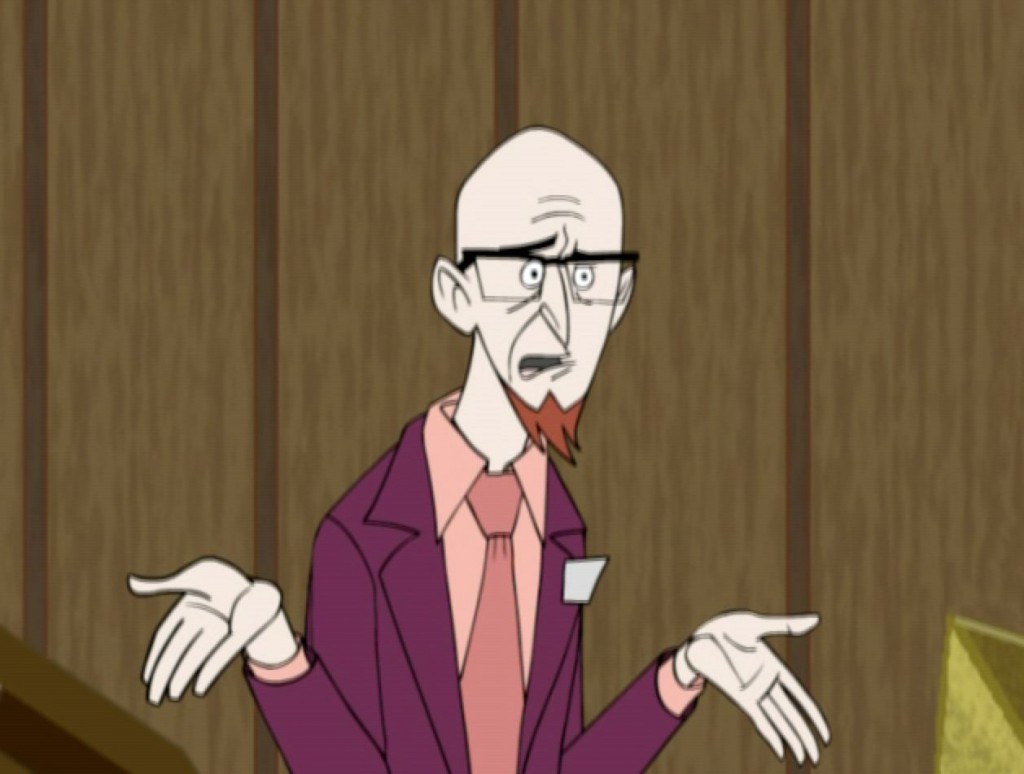
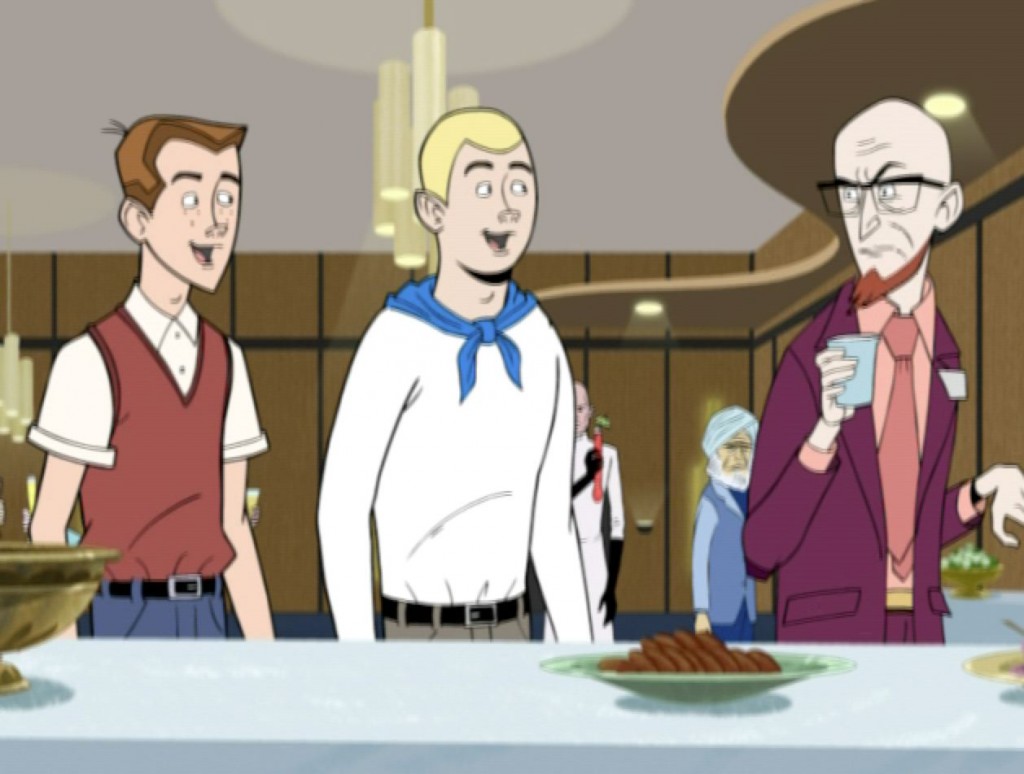
Your analysis is in-depth and brilliant. Please keep it up. I’m a huge fan of the show, and you’re helping me understand it better, and on many levels as well.